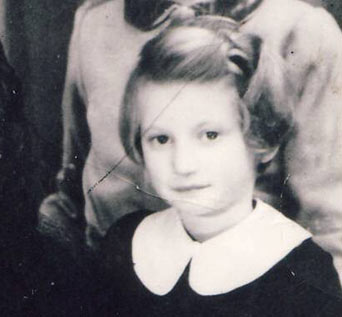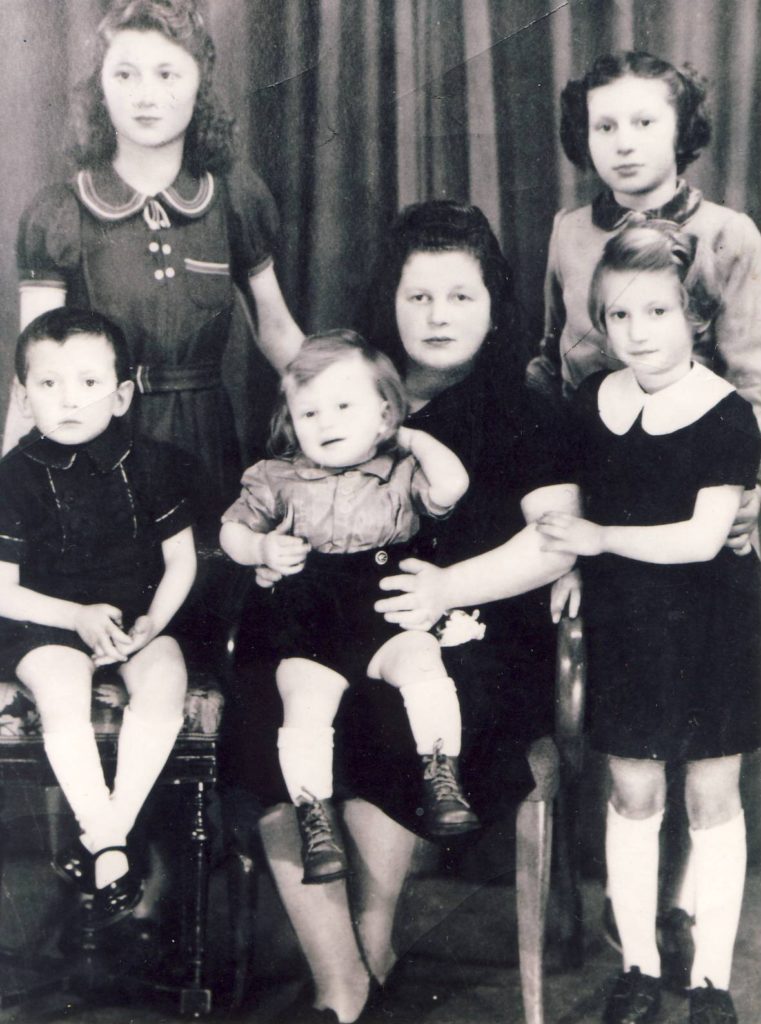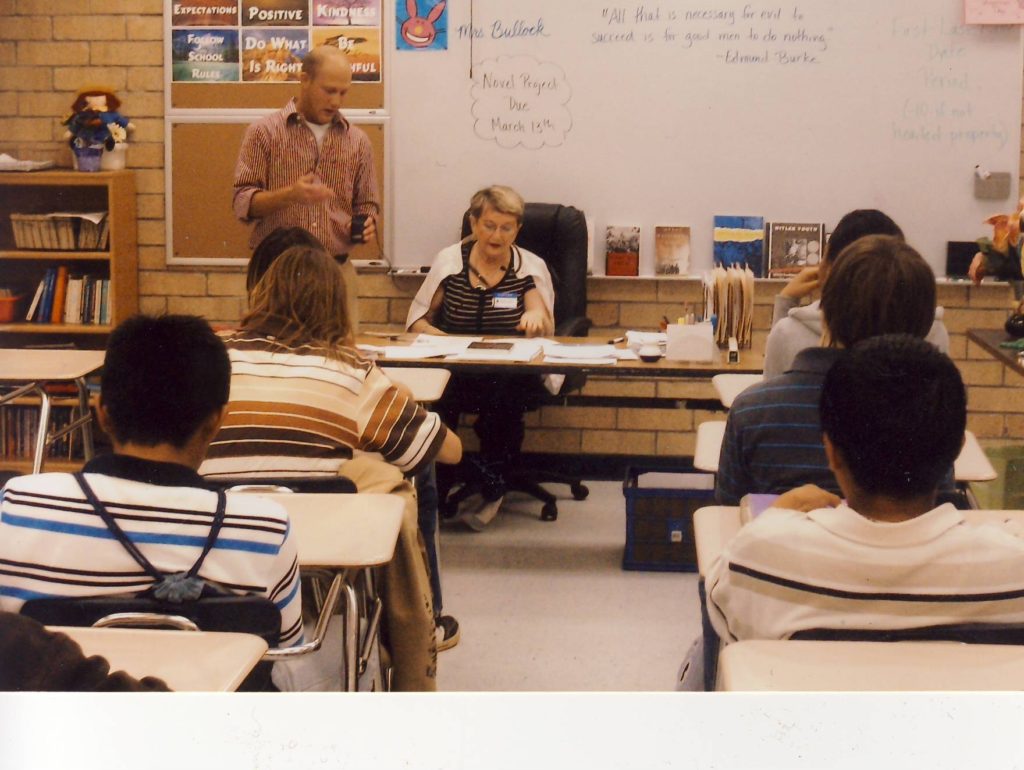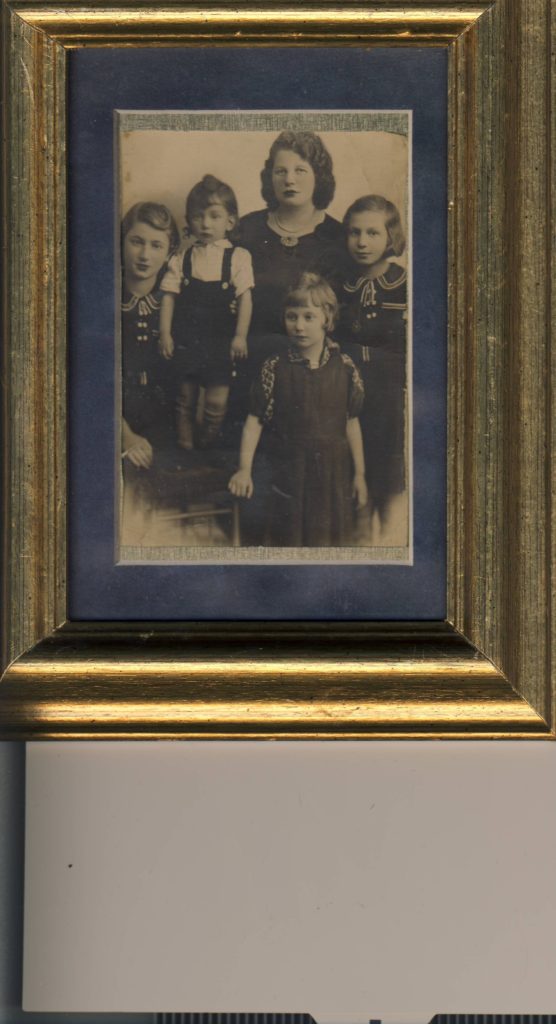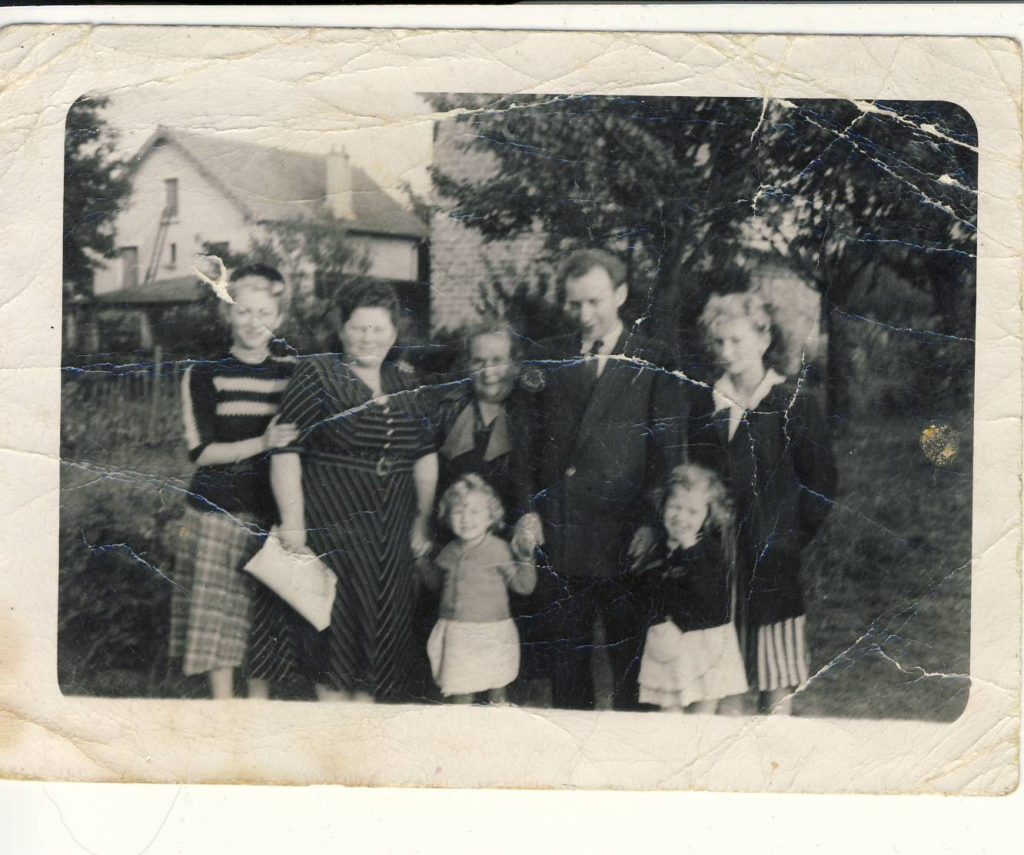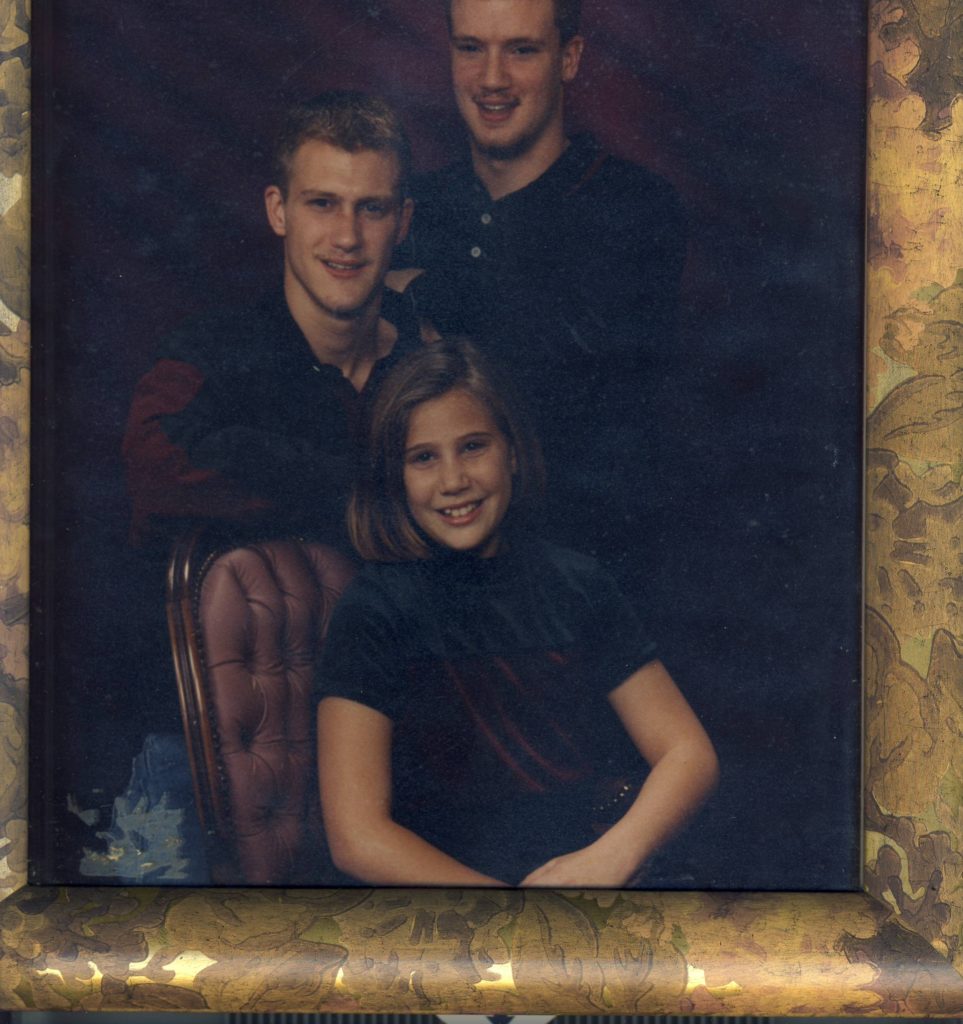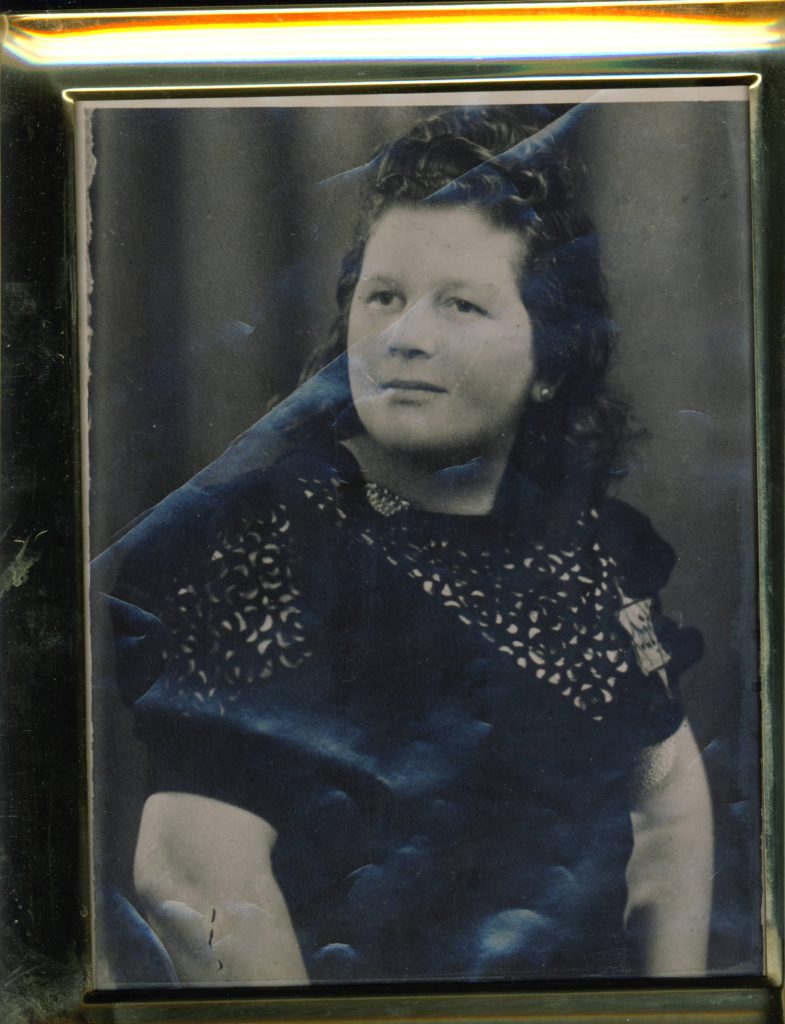PRINCE: Okay.
CORI: I love Felicia. She…
PRINCE: Felicia Graber.
CORI: Felicia Graber. She is the most humble lady. The most wonderful person I have ever met. She, um. She started the group, and I found comfort there.
PRINCE: And if you don’t mind, can you tell me just a little bit about, just tell me whatever you can about the group?
CORI: About the group? We met, I saw that in the Jewish Light. I called her. And we met it was five of us, and, um, we now twenty-one.
PRINCE: Yeah. I was gonna say you were there in the very beginning.
CORI: Right. And it’s been wonderful. I’ve really enjoyed every one of them.
PRINCE: And what is it? What do they do? What do you do?
CORI: I don’t know. We talk book revi- anything. We don’t always talk about the war. We have fun. But if we feel like crying, it’s okay too. We just, we just very comfortable. A comfortable feeling.
PRINCE: And how often?
CORI: Once a month.
PRINCE: Once a month.
CORI: I am very happy. I need that group.
PRINCE: Yes. And that group needs you, I’m sure.
CORI: I, I really enjoy going there. And like I said, I don’t drive all over, but they’ll pick me up if I need to. Some people suffered more than other, but everybody suffered their own way a lot.
PRINCE: And that helped you learn that you too could…
CORI: Right.
PRINCE: Could give in to.
CORI: But I’m the only one that found their family. There’s no, no such a thing. My father came back form the camp, my mother and the five kids, it’s unique.
PRINCE: Well, let’s talk about your dad for a minute, because we really didn’t. We just, you just told me that they came and told you to be ___.
CORI: My dad was a volunteer for the army, hoping that they wouldn’t bother him. That they would help his family, whatever. He, he was from Poland, like my mother, and, when he came back from the army, they took him to the camp of Gurs. Hard labor. They took him, uh, to Setfond4.
PRINCE: To where?
CORI: Another camp, Setfond. Where every, once a week, truck, lots of trucks would come and pick up for Auschwitz. How he escaped, is amazing, amazing. The round-ups. Because it was also luck, luck, luck. They wanted fifteen guys with the name of M, uh, twenty guys with the letter L. It didn’t matter it was completely dice, dice, _____________
4. Setfond is a non-verifiable spelling of a force labor camp in France.
gambling. With human lives. Uh, he came back with a finger like this, but uh, he got wounded, but uh, he came back. Cause he came back he was, like, forty pounds. I was in front of them.
PRINCE: Did he go, so he went to Auschwitz?
CORI: No.
PRINCE: No. He went?
CORI: No, never made it. To the French camps.
PRINCE: Oh, to the, oh.
CORI: But he kept on switching camps. And that, If you stayed more than two weeks in a camp, you were shipped. So whenever they wanted volunteer to dig, he would always volunteer. So, every place he went he was there for two weeks. I think, that’s his survive – I think.
PRINCE: Yeah. What about your mom?
CORI: My mom lived in the forest. Sometime one foot from the peasant, sometimes not. Hiding uh, (took a deep breath) in a farm plucking chickens. Whatever, two days here, two day – there was no place for her.
PRINCE: Did you find your brother? After?
CORI: Eight months after the war. They found me five months after the war.
PRINCE: How did they?
CORI: Cause they didn’t tell me the war was ended, the people.
PRINCE: Oh.
CORI: They kept me in the Ger- they kept me as theirs. The Red – The Jewish Red Cross. They was, they found me. Because my father complained: “What happened to those children from the, from the Chateau?”
PRINCE: Oh.
CORI: They don’t know. All they know is they were put on that train. To do a search it took five months. I had a different name. My name was Marie Colco. C-O-L-C-O. Not Kolkowicz. I didn’t know what was. My brother. I don’t know where my brother is. What do you mean you don’t know where your brother is? No I don’t. I was in the attic. From the attic, I was, I never went back to the orphanage. And so, uh, they found him eight months after the war. He was a rebel.
PRINCE: He was what?
CORI: A, a, violent seven year-old.
PRINCE: Oh, a rebel. Yes.
CORI: Yes. He would have hit my – It was unbelievable, and until he got straightened out, took a long time. He was very rebellious, very rebellious. My sister, Ida said, “You lay a hand on her (his mother)- Yeah. He was so, I really don’t know what happenend.”
PRINCE: What, what, what did Ida mean?
CORI: What?
PRINCE: What was your sister trying to say?
CORI: “I’ll, I’ll, uh, uh, I’ll beat you, you will never have a piece a hair on your head.” [tape messes up].
PRINCE: She didn’t want anybody to hit him?
CORI: She didn’t want him to hit my mother.
PRINCE: Oh, hit, oh.
CORI: He was seven years old. It was storms. He was very mad. Very angry little boy. Don’t forget he was four.
PRINCE: So how did the family form together again? Who was there first, who then came? When did your father? Do you remember that, um, how did you get to be?
CORI: By the time the red cr- the L’O.S.E. – the Red Cross, I don’t know who, kidnapped me from Church, two people held me. I remember screaming, screaming to the train. And my father was waiting at one of the stations, took me to a farm. My mother was there with my sisters. My brother was not there yet, we didn’t find him. And then we went – I remember the next day we went back to Paris. I mean, I, I was a kid too and I had so much problems. I was also, a rebellious, I was mad. I didn’t want to leave that family.
PRINCE: So you have a –
CORI: To me they were strangers.
PRINCE: Yes.
CORI: I was mad that they left me. I was, there was other anger when you are a child.
PRINCE: Sure. Oh, Marie.
CORI: And then when I saw my mother pregnant, I was almost mad. I say – how could she get preg- I mean, she couldn’t take care of us. OH, I was – a lot of anger as a kid. But as you grow older you understand all that.
PRINCE: How do you learn to understand, though, how is that, how do you, how did you return to life, Marie?
CORI: To normal?
PRINCE: Yes?
CORI: My fathers tears.
PRINCE: Your father’s tears.
CORI: Yeah. That was, I couldn’t believe I could give him so much bad.
PRINCE: But also, he was telling you how much you mattered to him, wasn’t he?
CORI: Yeah.
PRINCE: And how much you –
CORI: He just couldn’t deal with this. And one time, only one time, did I do it before I went to bed, I went on my knee and I started, never finished it. Not because he was coming.
PRINCE: No because
CORI: Because it’s enough.
PRINCE: But was there love in there, I mean, could you, did you feel his, or did you, was it?
CORI: I had pity.
PRINCE: Pity.
CORI: I… (pause) I thought if I don’t do the prayer I’m going to the devil.
PRINCE: Yeah. You were taught that, right?
CORI: Right. I was scared not to make the prayer. And I missed not going to confession, although I had nothing to confess.
PRINCE: Hmm, habit.
CORI: And I remember one day, I made a step to the church and I went back to the school. I didn’t go in. So it took maybe two, three days after the tears. I was completely, you know. But guilt stays with you a long time. I saw the fathers of somebody from the family that were killed. I would walk like this. I was ashamed to be alive.
PRINCE: So you went back to where you lived before?
CORI: Yes. It was an empty building.
PRINCE: Oh.
CORI: Empty school.
PRINCE: Empty school.
CORI: There was a plaque, I went back. I was, I went back to my school. I saw they had a plaque and people put flowers, but… I don’t remember. I don’t remember. Not all the kids end there. Because the ones that have the parents gone, everybody’s gone, are not there. Cause somebody pays to put their name, you know how it goes, a survivor. So the kids in my building that went to the school are not on that list.
PRINCE: Mmm. You’re, you’re very kind to do this and I can see what it does to you, so I know, I mean, I don’t know, I’m, I’m, uh, I’m thanking you for, for talking with me.
CORI: I, uh, because of my age, and because I hear the denial, and because I feel guilty if I didn’t do it. Although it brings pains, it’s a, I want to do it. I, uh, You didn’t twist my arm.
PRINCE: No. I, I think um, it’, it’s very brave of you to uh…
CORI: It’s not brave or its not uh, it’s uh, it’s a story. There was worse.
PRINCE: There’s always worse.
CORI: And uh, I know that that’s why, but uh – the pain never, there was plenty pains.
PRINCE: You know its too bad that, um, I mean I hear a lot of stories, and I hear a lot of peoples memories and, and um, and different kind of projects I’ve done. And I think that’s such a shame to feel that there is a comparing of pain because it’s uh,
CORI: Yeah. That’s-
PRINCE: It’s all lousy.
CORI: No, because I hear such stories, that you couldn’t, that I couldn’t. I would be embarrassed to tell my story.
PRINCE: You mean deeper than what we…
CORI: Oh my G-d yes.
PRINCE: Yes, I know and I, I could keep you and ask you more, but I think that for your sake.
CORI: No. But see, with my group, it’s okay.
PRINCE: It’s okay. Sure.
CORI: My group is okay.
PRINCE: Yeah.
CORI: That way.
PRINCE: And I would understand that. And I would be okay too, actually, it’s just that you don’t know me.
CORI: Yeah, but I think I do.
PRINCE: Well, I, I think.
CORI: I thought you were a sister.
PRINCE: I feel that, as I told you, I could delve into another layer of memories. But I think that this is maybe, what you wanted and this is.
CORI: The hidden children were quiet for a long time.
PRINCE: There’s a… Did you feel, did you feel like the fact that you were so abused that you had done something wrong to be punished like that.
CORI: Yes. It must be bad to be Jewish.
PRINCE: Yeah
CORI: That’s what they put you, this in the brain. Talking as a kid. Why? Why, why why aren’t we like everybody else go to Church. I mean, then nobody would bother you. You felt comfort.
PRINCE: Mm-hmm.
CORI: They give me papers, baptized. You know, I mean, but there was no German there. Where I was. The last place. I was not afraid there, and I was clean most of all, I was clean.
PRINCE: What frightens you today that brings back a memory of?
CORI: A freight train.
PRINCE: A freight train.
CORI: I turn my head all the, I can’t.
PRINCE: A uniform?
CORI: Policemen. Anybody.
[Background noise, tape cuts]
PRINCE: That’s okay.
CORI: Anybody, like customs. Or they want me to be, uh, what do you call it. UH, in a judgment. Under jury. I can’t, I just can’t.
PRINCE: Mm-Hmm.
CORI: I am paralyzed with fear. Just paralyzed…
PRINCE: So what do you tell them?>
CORI: Nothing. But they see the fear, they always check me. It could be a hundred people that call me.
PRINCE: But, you don’t. You don’t explain to them? Do you go and do it?
CORI: What do you mean?
PRINCE: On jury?
CORI: No, I can’t.
PRINCE: But how do you, you just say?
CORI: I just say, uh, uh I, I , I don’t know , my doct- I can’t do it. It’s I, I, I can’t.
PRINCE: The weather? Does the weather?
CORI: No. Uh. Fireworks. Yeah, fireworks. That kind of noise, yes.
PRINCE: Mm-Hmm. And how long does this uncomfortable last? You know, the fear. Does it just?
CORI: (Pause) It’s funny, because lightning doesn’t but fireworks does. Why I don’t know. Uh, how long it last? Until it’s over, until I don’t hear it. But I, I, Yeah.
PRINCE: Jump?
CORI: I jump.
PRINCE: Marie, what about eating again? Eating normally at a table and? Food and?
CORI: I had something that lasted me ‘til today that my group doesn’t know. I have to go with my finger at the end.
PRINCE: Oh, on the plate?
CORI: Even if its, I gotta do it my, I got to do, I uh, I, it’s a habit. My dad would get mad, I can’t, and if I’m in a restaurant it’s embarrassing, but I got to do it.
PRINCE: Does it?
CORI: The last lick. (laughs)
PRINCE: The last lick, yeah.
CORI: And then my fridgedaire has to be full to the milligram. To the, the freezer has to be full. I cannot be without food, even if I throw it up.
PRINCE: Mm-hmm.
CORI: I spend more on food than anything.
PRINCE: Makes you feel secure?
CORI: I don’t know. Yes. Yes. In fact, Brian says, “You have such a joy to watch me eating.” I don’t know why, but I enjoy watching people eating.
PRINCE: You were, you were how old, you were seven and it was, how old were you when the war, when they brought you back home?
CORI: I think ten and a half or ten.
PRINCE: Um, and to be to be clean again?
CORI: I was clean at this point. And I
PRINCE: That’s right. You came home, you were clean. You were clean.
CORI: Yes, yes. But, oh, there was a time, I mean, covered with lice. Covered, covered. They multiply. I had no way to get rid of them.
PRINCE: Did you even, did you…?
CORI: Oh constant scratching. I was so weak, I was so dirty. They would go in my open wounds.
PRINCE: I wish I could just put my arms around you and..
CORI: Nah, it’s over. I still have some after the war, cause I remember my mother taking me to a hospital and they put me sulfer. It hurts, and they scrubbed it. It was horrible. It burns. I had still some that you could. They were so deep infected.
PRINCE: Yeah.
CORI: But I was pretty clean. Believe me how she took me home, that lady, to sleep in the same bed as her daughter, making in bed the lice, the filth. I don’t know how she did it. I don’t know if I could do it.
PRINCE: Were they, like devout Christians? Were they very?
CORI: Very. Oh, yeah. Oh yeah. They were, I think, from Belgium originally. The school was in the Church.
PRINCE: But you don’t remember their names, or anything. Isn’t that remarkable?
CORI: I would do anything to find that man.
PRINCE: I’m sure you would.
CORI: I would.
PRINCE: You know. Its interesting that you were, I don’t know I have the right word, but you went from such deprivation and abuse to to this kinder family.
CORI: Yes.
PRINCE: It’s like a bridge.
CORI: Out of pity.
PRINCE: Yes out of pity, but, and love of ones
CORI: Not all the French are bad. There was some good ones. Or they hated the German more than they hated the Jews, whatever the reason, they saved my life.
PRINCE: But, but it was like a bridge. That you were clean when you went home, you were clean when you left home.
CORI: Yes I was. I was, I was, I if my parents would not be back, I would be a nun today. That’s how religious they made me be. That’s that’s would have been my life.That’s it. And we lost a lot of kids like this, don’t get me wrong.
PRINCE: But, but, even though they probably, you feel they wanted to convert you, that was the only way to save you at that moment.
CORI: But the war was ended, and they didn’t tell you.
PRINCE: And they didn’t tell you. I’m glad I asked that question to make this point.
CORI: No, they continued.
PRINCE: They continued, they continued, Oh.
CORI: No, no, no. You see. So, I’m so sure the man that saved my life for no reason, but a human being.
PRINCE: But what?
CORI: That man.
PRINCE: That man.
CORI: I would do anything to, to see him face. I don’t know.
PRINCE: Was like an angel.
CORI: An angel. An angel. I’m telling you, if he would have been caught I would have been dead. Because it was bad up there. It was dark, there was no light, there was, was nothing. He came with the little flashlight.
PRINCE: So they weren’t feeding you, he was.
CORI: Nobody knew I was there.
PRINCE: Well somebody put you there?
CORI: The sup- the mother Superior with him. I never saw her again.
PRINCE: That’s what I’m saying, she just left you there?
CORI: Yes. She left me, and he’s he took over. He must have worked with the partisan. I don’t know. Very devoted to me, brought me a comb. Do you know what a comb was?
PRINCE: That’s a, a remarkable thing to give somebody because it allows you to become an –
CORI: I, could at least kill a few lice.
PRINCE: But yeah, but inside you’re, you’re,
CORI: I had nothing to do.
PRINCE: Yeah, yeah it’s a normal
CORI: Was black, no watch, no nothing. Complete isolation. Fighting the mice. That was my toy.
PRINCE: But that was, like, beginning to bring you back to life, it was..
CORI: The comb and the cat. He brought me a cat. You know what a cat, oh my God, it was my life.
PRINCE: Did it have name? Did you give it a name?
CORI: I don’t even know what color, it was dark. I lived in pitch darkness. I don’t know the first name. I cannot tell you. But there was some good people.
PRINCE: Could you trust again? I mean, was that a thing for you?
CORI: Can I trust again? Trusted my husband, was wrong. (laughs)
PRINCE: Was wrong… That’s uh,
CORI: Yeah. I, I’m, uh I would say, I’m always ready to escape, somehow. If I sleep it’ll be, I’ll tape the window or the door, I mean I’ll… I’m always ready for a catastrophe. With food, with…
PRINCE: You’re aware.
CORI: I’m aware that things can happen. Overnight.
PRINCE: With good reason.
CORI: Yeah.
PRINCE: Yes. Wow. DO you believe in God, Marie? That’s your business.
CORI: Not really.
PRINCE: Not really?
CORI: No. I could let, all my school. No, I don’t believe.
PRINCE; Would be hard.
CORI: Only when I went to Israel. I, I believed in something. I don’t know I was, so.. It means everything to me.
PRINCE: When you saw their flag?
CORI: When I saw the flag, when I saw our plane, there is a plane, we have a plane. When I saw the man on the street cleaning, a Jew. Everybo- I don’t know, I was reborn there.
PRINCE: And when did you go?
CORI: ‘79, first time. I went back many times, but I always have the same feeling.
PRINCE: Are you tired, would you like to stop?
CORI: No.
PRINCE: Okay. Could I ask you, um, when did you come to America?
CORI: ’51. I wanted to go to live in Israel. (Heavy sigh) But my mother, “You went through enough, you would have a rough life there.” She would not let me go. You know. It was not, it was tent living. It was hard work at this time. She wouldn’t let me go. And so, I had a sister in Chicago. My sister, Ida that saved our life. She say, if you wanna go someplace, then go to see your sister. But don’t go to Israel where they gonna force labor you. She had right. You know.
PRINCE: Mm-hmm.
CORI: Anyway, I. But that was not my call. I came here and was very bored. I was very. I thought kids my age, I was sixteen, were very immature. You know. I, I just,
PRINCE: It was tough.
CORI: Yeah, It was tough. I didn’t belong.
PRINCE: Yeah.
CORI: I didn’t belong. My friends were all older people. I couldn’t deal with sixteen year olds. High school and giggling for nothing. I just.
PRINCE: Yeah.
CORI: Yeah.
PRINCE: And you, you certainly weren’t?
CORI: I don’t know they were not, they were like. They not act like sixteen. I thought I acted sixteen. They acted more like ten, eleven.
PRINCE: Well, what you had already done and seen and
CORI: Yeah. But then I met my husband that just came back from Israel. In the Hagannah.
PRINCE: Oh, oh he’d been in a Hagannah?
CORI: And I say, hooo, with him I’m gonna go to Israel. See, never marry for a reason. I mean, it was always Israel in my mind. (pause) Always.
PRINCE: Did you go back?
CORI: I went back, um, his father was born in Jerusalem. After the divorce, no. We had to sell everything.
PRINCE: But did you live there or did you live here?
CORI: I lived here, but I took my grandchildren, you know.
PRINCE: Mm-hmm. Yeah.
CORI: Yeah. That’s it.
PRINCE: That’s it.
CORI: That’s my story.
PRINCE: That’s a…
CORI: And I’m very very content now with my grandchildren they’re very close to me, and um.
PRINCE: Well, we’ll just put Brian’s name on this interview, because…
CORI: Oh that Brian.
PRINCE: I haven’t met him, but I’ve certainly talked to him and..
CORI: I adore him.
PRINCE: Yeah
CORI: He’s been my support, everything. We more like two friends. He leans on me, and just that I like to gossip and he doesn’t, so.
PRINCE: (laugh) Well I am very greatful to you for allowing me to come in and…
CORI: You never drank your coffee.
PRINCE: Yeah. I’ve been drinking a little bit. I had some at home, but. Um,
CORI: But, I feel for future generation maybe it’s important.
PRINCE: Well, I think it is. I think to give voice to people who have something to say is…
CORI: I went to a school, a high school. I was forced to go to the high school. I mean in fact, I. That day it was snowing, I was so happy I said I’m not going and she picked me up.
PRINCE: Who’s that?
CORI: The teacher.
PRINCE: From, In St. Louis?
CORI: Yes.
PRINCE: Oh. Where did you go to high school. That’s our question?
CORI: To speak.
PRINCE: Oh, you mean to go to speak. Oh.
CORI: oh. Parkway, or no,
PRINCE: Yes.
CORI: Oh I don’t even know where she took me. But anyway, I thought they were gonna yawn, and I would have been very upset. I didn’t wanna go. I did a, I was, they did me a service. Because a year later, at Schnucks, I met a young man, a young man stops me. He said: “Where do I know you from? Are you a friend of Brian? You went to speak to my class.” And he kept me for an hour and a half at Schnucks, and then I figure, well, it was important.
PRINCE: Yes.
CORI: You see I was wrong.
PRINCE: I’m so glad you had that experience.
CORI: Yeah. Because I though, ugh, they gonna be so tired of it. Because I know my kids say, “oh, stop it!” They don’t want to hear. So I never speak. You know what I mean?
PRINCE: Sure
CORI: It’s over. When they were little. I must, cause I would wake up sometimes with nightmares. But uh,
PRINCE: But its never over is it Marie? It’s really never over.
CORI: (Pause) No. No. For instance, once we went to Eilat, on a tour and the bus hundred people. Ninety-nine were Germans. I thought I was gonna die. I really saw blood coming out of, all the people. Cause young people, it doesn’t do that to me. I froze. I was like, thank God I was in the back. I just froze. And “shane Judenland” they would say. “beautiful Jewish land”. I couldn’t wait to get out of the bus. A very odd feeling.
PRINCE: Yeah.
CORI: Very. And drinking and drinking.
PRINCE: And it’s hard for people.
CORI: I saw blood coming out of their hands. I couldn’t get that blood away from that finger. Every one of them.
PRINCE: And nobody can really understand what…
CORI: I never got very quiet, no. No, I didn’t even tell my husband. I just, I saw blood dripping.
PRINCE: Mmm.
CORI: He must have killed us. He must have, I, that’s when the flashback came back. A lot. On that bus. I thought I was going, ‘til today, I cannot go to a carwash. I can’t go inside. I can’t. I don’t know what it does to me, that Jet. I feel like its gas. And my grandson takes the car. I can’t go. Just, I, I, I can’t. I did it once with somebody and I freaked out.
PRINCE: That would be
CORI: I, I don’t know what it does.
PRINCE: Yeah.
CORI: Why?
PRINCE: Because, Because. Either you confined in the attic.
CORI: I don’t know.
PRINCE: Maybe the attic, thing. You know? I mean it
CORI: I don’t know why.
PRINCE: It doesn’t matter, if it bothers you, it’s touching something.
CORI: Right.
PRINCE: That happens.
CORI: Now, like at Halloween with the straw and the pumpkins. I don’t go.
PRINCE: Yeah.
CORI: I feel like mice are gonna come out of that.
PRINCE: Sure.
CORI: Or rats, I’m polite when I say mice.
PRINCE: Yeah, no I can understand. I mean, I know, I can hear what you’re saying. You had enough things happen to you that…
CORI: But then, people had it much worse.
PRINCE: Well, yes, but that doesn’t – it doesn’t really. That people had something worse, doesn’t really have anything to…
[End of Tape I]
CORI: Cause none of my group, not one that is of the whole family.
PRINCE: Well it is amazing. So you feel lucky you said?
CORI: Lucky and it’s like you know. They have it so much worse.
PRINCE: Yeah, I, I said this off the tape, but I, I I’m sorry that I
CORI: No, I repeat it. I’m repeating it.
PRINCE: Yeah, but I’m sorry that I said about comparing pains.
CORI: Yeah, No, each one of them have the pain. Different pains, but the same pain. Um, it’s a comfort to be with them, every one of them. Although we each have our own lives, at that moment when we meet, it’s like, it’s a good feeling. We don’t have any men, the men all don’t want to go and men were not survivors because of the circumcision. Girls were easier to hide then the boy.
PRINCE: Oh, that’s something.
CORI: Yeah
PRINCE: That one wouldn’t think about, but it’s true.
CORI: Yeah. Cause in France, nobody was circumcised. Only Muslims and Jews. And so that was easy.
PRINCE: Hmm.
CORI: You couldn’t say “I’m a gentile, here’s my butt” They take down your pants, that’s it. But we, blondes, we could get away with it. I was ver- I was platinum blonde, I was very blonde.
PRINCE: Where were your sisters?
CORI: Uh, Ida and Rachel were in Moissac, the L’O.S.E. placed them there. To farms, to help with the farms.
PRINCE: Mm-hmm.
CORI: Ida was like a minute from being caught. A doctor and his wife and a baby, took seven girls in a little village. All Jews. My sister was walking, she went to the camp to see my father, in Setfond, you could visit there. It’s in the same region.
PRINCE: Labor camp?
CORI: And she turned the corner, and it was too late. They were all on the trucks, and like twenty Germans. And he say, “Who’s this?” And the Doctor say “That’s the girl that has the baby.” And they took the baby off the truck and give it to my sister and let my sister go.
PRINCE: Hmm.
CORI: They were all killed. The doctor is the only one that came back because he was a doctor. They were all d- all gone. And my sister, I mean by a second.
PRINCE: Yeah.
CORI: And the baby in her arm, I don’t know what she did with it. She was fourteen, fifteen.
PRINCE: Mm-hmm.
CORI: Or she’s the maid and that’s a baby. And took the baby from the mother and gave it to my sister. And this the daughter survived, it was a little girl.
PRINCE: What was the relationship between the two children that were born after the war and the children that went through so much?
CORI: Okay. Actually, Ginette was born right before the war. My father and my mother must have met in the forest because she was born before ’45. So she was born like five months before the war ended. So she was born when I came back, she was a beauty. Uh, I was like, she was like a doll. Ginette was born, they put her in an orphanage. She was found in an orphanage, also filthy, neglected, and everything. She doesn’t remember anything, but my parents do. How lucky they have – they found Ginette. With no name, with no… L’O.S.E. did a job that was unbelievable.
PRINCE: It seems amazing.
CORI: Unbelievable under the circumstances.
PRINCE: Well even that your father and mother found each other.
CORI: Oh. My mother, when we got hidden with the L’O.S.E, was not far from Setfond. I remember like, around, before we went to the castle, we went to that village. I remember cause I went to that camp, outside and we saw the trucks and people tearing up their shirts, you know, they – that would take them to the , to the trucks. I remember that, uh, they were tearing up like somebody dies, you know, we got to tear something. I remember this with the flashlights, with the, uh…
PRINCE: You mean people were tearing their own clothes?
CORI: Oh yes.
PRINCE: Because people were being taken away? Is that what you’re telling me.
CORI: The people that were going on the trucks to be gassed, they were screaming, and you could- I, I remember this. They were tearing up their clothes. Um, They knew it was the end. So, I remember that we, because the people form the camp used to give us food. I remember… Cause it was, we were an inspiration to those guys. If they’re alive, maybe ours are alive. We give them inspiration. So they would, I could see the eyes, the, the, they were happy to see us. We couldn’t go inside, we were outside. But our village was not far, walking distance, we used to go. And one night, we saw when they were taking to the trucks and uh, I mean, we – I’m not talking a truck, I’m talking fifteen, twenty trucks. And then, well, I just mad. Just, they were… It’s a lot of com, co-, how do you say? – noise and I remember being frightened. Uh, very noisy, uh, and lights going back and forth and a lot of stuff like that.
PRINCE: Chaos.
CORI: Chaos, yeah. I couldn’t find the word.
PRINCE: Yeah.
CORI: Yeah.
PRINCE: More than chaos.
CORI: Yeah, it was like, I don’t know.
PRINCE: Hell?
CORI: Hell, yeah.
PRINCE: Like you would think hell would be?
CORI: Yeah. Like what’s going on? I remember telling my mother, let’s talk. You know? I was- we were afraid they were gonna take us too, find us. Because there were lights going from all over. See if somebody escapes, whatever.
PRINCE: Yeah.
CORI: But they would give us food, over the…
PRINCE: Mm-hmm
CORI: All the men would give a piece of bread, it was good.
PRINCE: So your whole family came here?
CORI: No, I’m the only one. My sister, Ida, died.
PRINCE: No, but they, but were your, was your family in this country?
CORI: No.
PRINCE: No. Just you?
CORI: No. Just me and my sister, Ida. In Chicago. Now I, my whole family’s in Paris.
PRINCE: And did you go back to see your mother and father?
CORI: When?
PRINCE: After you came here?
CORI: Oh. Even on credit card, but I went. Money or no money, I went every year.
PRINCE: How long did they live?
CORI: Uh, my dad was seventy-nine, my mother seventy-eight. And my sister died at sixty-four, the other one sixty-four, my brother sixty-two, my little brother. That’s a good looking guy.
PRINCE: Where’s your little one?
CORI: But, the one you see here.
PRINCE: Oh here, yeah.
CORI: Just passed away two years ago. Lung cancer. Oh what you see black is my ex-husband, I don’t want to see him anymore.
PRINCE: Oh, get rid of him [laughs].
CORI: [laughs] Yeah. I’ll black him out, that’s, yeah.
PRINCE: Alright.
CORI: But, uh, that’s it.
PRINCE: Thank you, Marie.
CORI: So what you do with that story…
PRINCE: What are we gonna do with it? We will…
CORI: Like in the archives?
PRINCE: Transcribe it. And we hope to, um, uh, well, actually part of the things we’ve done now, we have an audio tour where people put on the headphones and go through the museum, and we’ve used excerpts of these stories.
CORI: Really?
PRINCE: We hope either to make a book someday, or put it in a, some kind of documentary. But basically, we’re just gathering information for people’s voices to be heard, because it did happen as you say.
CORI: Yeah. We were once alive. But you know, I just lent that book to one of the group, because my brother gave me a book of all letters of children that were hidden in France. And I swear, every letter, I thought it was me.
PRINCE: Oh, sure.
CORI: And I said, Liesel, you gotta read this because you’re gonna recognize yourself. And she says, “Oh my God”. And I said then give it to Felicia, because Felicia is fluent in French.
PRINCE: Right.
CORI: She’s very educated.
PRINCE: I just read, when I was getting ready to do this with you. I, I came across a book in my own library, called um, “Memory Fields” by Shlomo Breznitz.
CORI: I don’t think I read it. I read it.
PRINCE: It’s a wonderfully written story…
CORI: From France?
PRINCE: Mm-hmm. Um, no, from Chechoslavakia.
CORI: That is the same thing.
PRINCE: But, but, interesting.
CORI: Yeah.
PRINCE: Thank you, Marie.
CORI: You’re Welcome.
PRINCE: Thank you very much.
CORI: You’re welcome.


